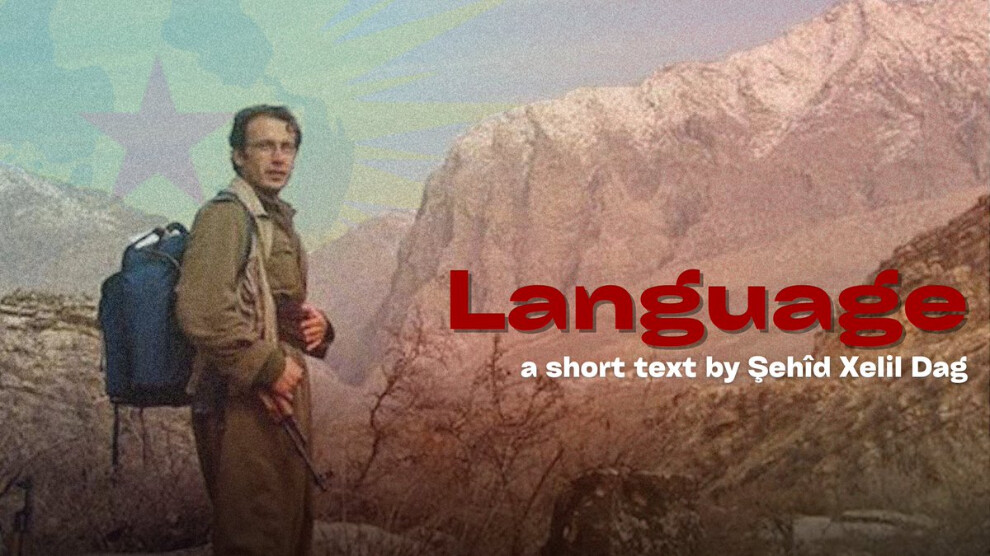Language, a short text by Martyr Xelil Dağ
Martyr Xelil Dağ wrote: "Language is the expression of our common culture, our thoughts and our feelings. When thoughts become words and leave our bodies, we initiate change."
Martyr Xelil Dağ wrote: "Language is the expression of our common culture, our thoughts and our feelings. When thoughts become words and leave our bodies, we initiate change."

Xelil Dağ (Halil Uysal) was born in Germany in 1973 as the first child of a father from Izmir and a mother from Ağrı. He fell as a martyr on 1 April 2008, killed as the result of a Turkish attack.
Dağ was a filmmaker and a guerrilla. On 1 April 1995, he travelled to the Middle East as an assistant to a German cameraman for an interview with Abdullah Öcalan. During the interview he got to know the guerrilla fighters in the central party school of the PKK better. After this interview with Abdullah Öcalan, which also represents his first meaningful work, he decided not to return and to continue his life's journey here. Since then, his life was in the mountains of Kurdistan, together with the Kurdish freedom fighters.
The Internationalist Commune of Rojava published a short text by Dağ about language on the occasion of Kurdish Language Day.
The text is as follows:
"Language is the expression of our common culture, our thoughts and our feelings. When thoughts become words and leave our bodies, we initiate change. The order of words, the melody and the emotions hidden in them are secret codes that tell us the history of the people. Languages are keys to our history, to the history of societies. Each language has a culture, a history, a past that is sometimes difficult to translate. With each spoken word, we move closer to the past of these cultures, understand our present and overcome the boundaries between space and time. We can feel and taste, see the world in other eyes. Languages open doors to new cultures, sometimes foreign to us. With every spoken and learned language, we gain beauty. The beauty of cultures decorates our souls and opens our hearts. Each word is a small piece of truth from the history of mankind. Each word is a piece of the treasure map that holds the way to the past. Words are sacred, they say in Kurdistan.
Through speaking, we can read people, enable interpersonal communication and connection, and access thoughts, feelings and moments. Through writing, we can capture and share moments. Share what we feel, what we think, what we live. Our longings, our dreams, our fears, our joy, our love. When we read, we fall into a new world, a world that is sometimes not ours, that is foreign to us. However, it meets us with new colors. Sometimes out of escape, sometimes out of curiosity, and sometimes it is the search that unites us with people. Through a direct encounter with the other it is possible for us to see ourselves in a reflection. With diversity and heterogeneity, it is possible to define ourselves. It is the mirror of life. Through diversity, we can express and find ourselves. Through diversity, we can gain infinite possibilities of life. It is the highest art of humanity to communicate interculturally and to open ourselves, to understand and to conquer our limits."
The Internationalist Commune of Rojava wrote introducing the text: "Martyr Halil Dağ is the expression of this reality. In his book “Benı bağışlayın” he describes fabulously, the emotions, the thoughts of a seeker. A seeker, a stranger who finds the beauty of life, his search for true life in the mountains of Kurdistan.
The mountains, the friends and life, teach him to understand a new language and to merge with it. Heval Halil Dağ is one of the first friends who, through his films and books, narrated to the world the beauty of the resistance and the love of the freedom fighters. If we want to understand the mountains, we have to speak their language. Open ourselves to a new world.
Heval Halil Dağ is a bridge to this new world. He is not only an artist who revolutionizes art and culture. He is a friend, a comrade, who, through humility, self-criticism and love, becomes the main character of his story. Heval Halil Dağ teaches us one thing above all, that the story we tell does not need objectivity. On the contrary, the story we want to tell must not speak the language of the others, but the language of the protagonists."